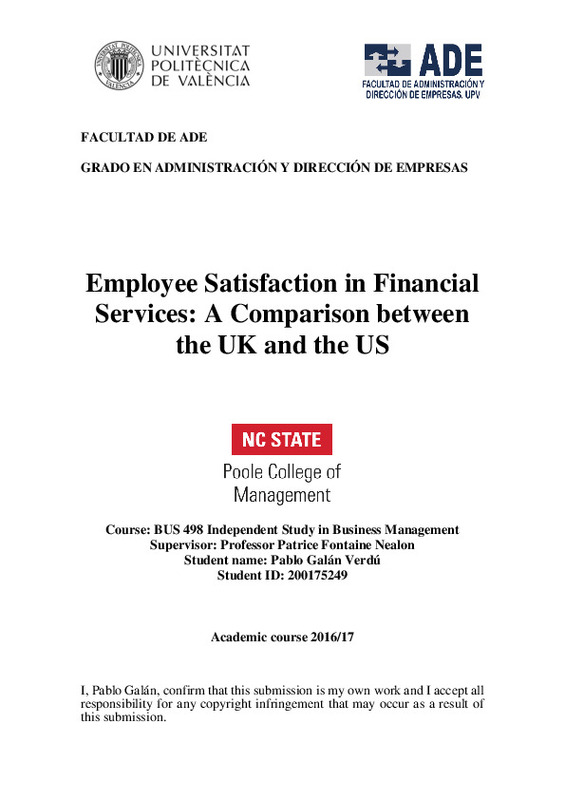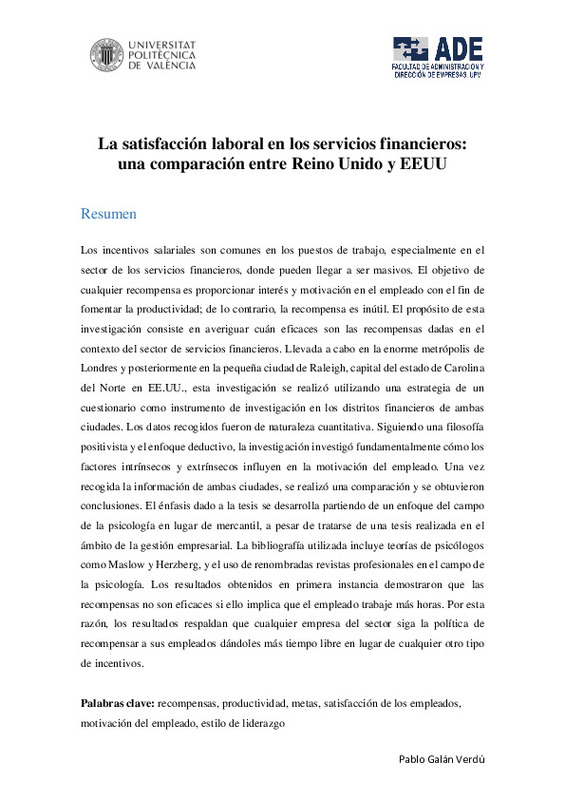JavaScript is disabled for your browser. Some features of this site may not work without it.
Buscar en RiuNet
Listar
Mi cuenta
Estadísticas
Ayuda RiuNet
Admin. UPV
Employee satisfaction in financial services: A comparison between the UK and the US
Mostrar el registro sencillo del ítem
Ficheros en el ítem
| dc.contributor.advisor | Skorczynska Sznajder, Hanna Teresa
|
es_ES |
| dc.contributor.advisor | Fontaine Nealon, Patrice
|
es_ES |
| dc.contributor.author | Galán Verdú, Pablo
|
es_ES |
| dc.date.accessioned | 2018-07-25T12:39:55Z | |
| dc.date.available | 2018-07-25T12:39:55Z | |
| dc.date.created | 2018-07-09 | |
| dc.date.issued | 2018-07-25 | es_ES |
| dc.identifier.uri | http://hdl.handle.net/10251/106243 | |
| dc.description.abstract | [EN] Rewards are common in jobs, particularly in the financial services industry, where they can be massive. The aim of any reward is to provide interest and motivation to employees in order to encourage productivity. Otherwise, the reward is useless. The purpose of this dissertation is to find out how effective rewards given in the context of the financial services industry can actually be. Undertaken in the huge metropolis of London and then in the small city of Raleigh, the capital of the state of North Carolina, this research was conducted using a survey strategy using simply a questionnaire as the research instrument in the financial districts of both cities. The data collected was of quantitative nature. Following a positivist philosophy and deductive approach, the research investigated how do intrinsic and extrinsic factors influence employee motivation. Once collected the data from both locations, a consecutive comparison was made and conclusions were developed. The emphasis given to the dissertation may come more from the point of view of psychology rather than a business standpoint, even though it is a dissertation done in the field of business management. The literature used includes theories from psychologists such as Maslow and Herzberg, and the use of sound journals in the field of psychology. The results ultimately showed that rewards are not effective if that will mean working more hours for the employee. For this reason, the findings proved that any company in the financial services sector should reward their employees by giving them more free time rather than any other kind of incentives. | es_ES |
| dc.description.abstract | [ES] Los incentivos salariales son comunes en los puestos de trabajo, sobre todo en el sector de los servicios financieros, donde pueden llegar a ser masivos. El objetivo de cualquier recompensa es proporcionar interés y motivación en el empleado con el fin de fomentar la productividad; de lo contrario, la recompensa es inútil. El propósito de esta investigación consiste en averiguar cómo son de eficaces las recompensas dadas en el contexto del sector de servicios financieros. Llevada a cabo en la enorme metrópolis de Londres y posteriormente en la pequeña ciudad de Raleigh, capital del estado de Carolina del Norte en EE.UU., esta investigación se realizó utilizando una estrategia de un cuestionario como instrumento de investigación en los distritos financieros de ambas ciudades. Los datos recogidos fueron de naturaleza cuantitativa. Siguiendo una filosofía positivista y el enfoque deductivo, la investigación investigó fundamentalmente cómo los factores intrínsecos y extrínsecos influyen en la motivación del empleado. Una vez recogida la información de ambas ciudades, se realizó una comparación y se obtuvieron conclusiones. El énfasis dado a la tesis se desarrolla desde un enfoque del campo de la la psicología más que desde un punto de vista mercantil, a pesar de tratarse de una tesis realizada en el ámbito de la gestión empresarial. La bibliografía utilizada incluye teorías de psicólogos como Maslow y Herzberg, y el uso de renombradas revistas profesionales en el campo de la psicología. Los resultados obtenidos en primera instancia, demostraron que las recompensas no son eficaces si ello implica que el empleado trabaje más horas. Por esta razón, los resultados respaldan que cualquier empresa del sector siga la política de recompensar a sus empleados dándoles más tiempo libre en lugar de cualquier otro tipo de incentivos. | es_ES |
| dc.format.extent | 98 | es_ES |
| dc.language | Inglés | es_ES |
| dc.publisher | Universitat Politècnica de València | es_ES |
| dc.rights | Reserva de todos los derechos | es_ES |
| dc.subject | United Kingdom | es_ES |
| dc.subject | United States | es_ES |
| dc.subject | Employee satisfaction | es_ES |
| dc.subject | Leadership style | es_ES |
| dc.subject | Psicología del trabajo | es_ES |
| dc.subject | Psicología organizacional | es_ES |
| dc.subject | Reino Unido | es_ES |
| dc.subject | Estados Unidos (EEUU) | es_ES |
| dc.subject | Recompensas laborales | es_ES |
| dc.subject | Incentivos salariales | es_ES |
| dc.subject | Sector financiero | es_ES |
| dc.subject | Estilo de liderazgo | es_ES |
| dc.subject | Satisfacción de los empleados | es_ES |
| dc.subject.classification | FILOLOGIA INGLESA | es_ES |
| dc.subject.other | Grado en Administración y Dirección de Empresas-Grau en Administració i Direcció d'Empreses | es_ES |
| dc.title | Employee satisfaction in financial services: A comparison between the UK and the US | es_ES |
| dc.title.alternative | La satisfacción laboral en los servicios financieros: una comparación entre Reino Unido y EEUU | |
| dc.type | Proyecto/Trabajo fin de carrera/grado | es_ES |
| dc.rights.accessRights | Abierto | es_ES |
| dc.contributor.affiliation | Universitat Politècnica de València. Facultad de Administración y Dirección de Empresas - Facultat d'Administració i Direcció d'Empreses | es_ES |
| dc.contributor.affiliation | Universitat Politècnica de València. Departamento de Lingüística Aplicada - Departament de Lingüística Aplicada | es_ES |
| dc.description.bibliographicCitation | Galán Verdú, P. (2018). La satisfacción laboral en los servicios financieros: una comparación entre Reino Unido y EEUU. http://hdl.handle.net/10251/106243 | es_ES |
| dc.description.accrualMethod | TFGM | es_ES |
| dc.relation.pasarela | TFGM\87753 | es_ES |
Este ítem aparece en la(s) siguiente(s) colección(ones)
-
ADE - Trabajos académicos [3474]
Facultad de Administración y Dirección de Empresas







